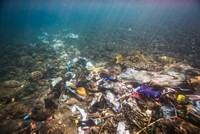Advertisement
Grab your lab coat. Let's get started
Welcome!
Welcome!
Create an account below to get 6 C&EN articles per month, receive newsletters and more - all free.
It seems this is your first time logging in online. Please enter the following information to continue.
As an ACS member you automatically get access to this site. All we need is few more details to create your reading experience.
Not you? Sign in with a different account.
Not you? Sign in with a different account.
ERROR 1
ERROR 1
ERROR 2
ERROR 2
ERROR 2
ERROR 2
ERROR 2
Password and Confirm password must match.
If you have an ACS member number, please enter it here so we can link this account to your membership. (optional)
ERROR 2
ACS values your privacy. By submitting your information, you are gaining access to C&EN and subscribing to our weekly newsletter. We use the information you provide to make your reading experience better, and we will never sell your data to third party members.
Persistent Pollutants
Plastics entering oceans could triple in 20 years
by Alex Scott
July 31, 2020
| A version of this story appeared in
Volume 98, Issue 30
On its current trajectory, the flow of plastics entering the oceans will triple by 2040, to 29 million metric tons per year, equivalent to 50 kg of plastic for every meter of coastline worldwide, according to a review of plastic waste by Pew Charitable Trusts and Systemiq, a company promoting sustainability. The good news in the organizations’ 150-page report is that available technologies could reduce current flow 80% by 2040. But achieving the goal will require comprehensive, integrated solutions centered on reduction and substitution of plastics, as well as better waste management. The obstacles to change are inadequateregulations, business models, and funding mechanisms, the report concludes. Even if industry and governments meet their current commitments, the world will see only a 7% decline in the amount of plastics entering the oceans by 2040, the authors found. The American Chemistry Council, an industry group, says it supports most of the report’s recommendations but cautions against replacing plastics with materials that have higher environmental costs.



Join the conversation
Contact the reporter
Submit a Letter to the Editor for publication
Engage with us on Twitter